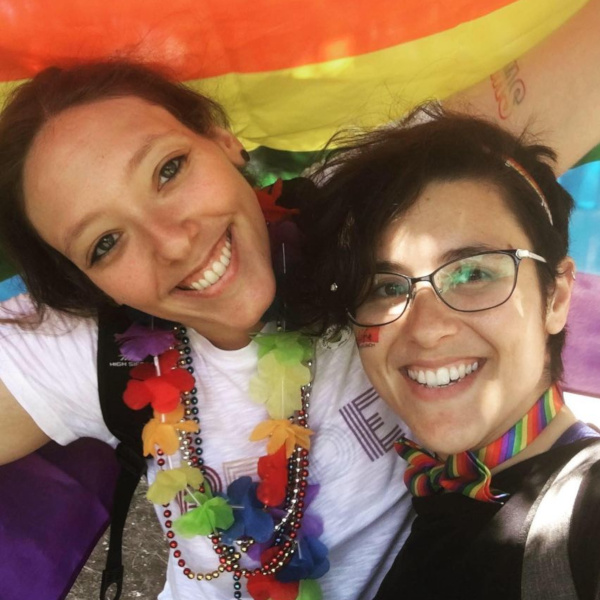Interviews with Olim
Each month, we interview an oleh or olah for our newsletter.
We invite you to read the stories of LGBTQ+ people who have made Israel their home.
"I believe that I am a part of the greatest experiment in Jewish history."
Interview date: November 2020
Q. Where were you born and where did you grow up?
Dvora: Born and raised in New York.
Becca: Born in Houston, Texas, but I grew up in Jerusalem since the age of 4.
Q. At what age did you come out? And how did it go?
Dvora: I started exploring my identity in high school and shared it as it came up in my conversations with my friends and family. I was blessed to be supported by incredible parents and a welcoming community.
Becca: Started coming out to close friends around age 16, and my parents at 19. No one was surprised. I asked my dad once how is it they didn’t need any time to adjust their vision for my future. He said he didn’t see me with someone of a specific gender, but that he always envisioned me having children.
Q. Were you involved at all in the LGBT community back home?
Dvora: Yes, I’ve been part of LGBTQ+ clubs throughout high school and college, and at my former workplace in NYC.
Becca: I’ve participated in activities and volunteered with the Jerusalem Open House (JOH) since I was 19.
Q. What is your involvement (if any) in the LGBT community in Israel?
A. We actually met when Becca was volunteering at Qulpan in Jerusalem. Dvora was new to Israel at the time and really needed to work on her Hebrew… and nearly two years later, here we are!
Q. How long since you made Aliyah?
A. Dvora had been in Israel since 2018, but officially made Aliyah exactly one year ago this week! Happy Aliyahaversary to Dvora 🙂 Meanwhile, for Becca it has been 25 years.
Q. Did you move here on your own or with family/friends/significant other?
Dvora: I came here all by myself (cue Celine Dion).
Becca: My parents made Aliyah with me and my three older brothers.
Q. Why did you make Aliyah?
Dvora: I grew up with very strong Jewish family values. My paternal grandmother (z”l) was so proud to be alive at a time when there was a safe place for the Jewish people, but she passed before I ever even visited the country. Becoming a citizen of Israel felt like I was following in the footsteps of my ancestors, achieving what they could only dream of.
Q. How is it going so far?
Dvora: It’s not easy, but you find the people and organizations you need along the way! Nefesh B’Nefesh made the whole bureaucratic process a breeze. I had a friend who was an olah hadasha and she became like an Aliyah mentor to me. Becca’s support (and language skills) have REALLY helped ease my acclimation process, and I found my community through the LGBT English Speakers Group.
Becca: Growing up here, I have a complicated love/hate relationship with this country, which I think is pretty typical of Israelis.
Q. What do you do in terms of work?
Dvora: I’m a conflict resolution practitioner working in the higher education and Jewish professional world.
Becca: I love helping people and informal education, and am working in customer service.
Q. How is your Ivrit?
Dvora: Od Lo Tov.
Becca: שפת אם.
Q. What has been your biggest challenge so far?
Dvora: I find the language barrier difficult in allowing me to really feel like I can be the best version of myself here.
Becca: Despite growing up here, I am really not very Israeli in attitude.
Q. How do you perceive the Israeli LGBT community?
A. It’s easier for society to group us together, but we are all so different, in our opinions and desires.
Q. How is being LGBT in Israel different to back home?
Dvora: I am so grateful that Israel is the most welcoming country to LGBTQ+ people in the Middle East, and I think we have a long way to go.
Becca: I’ve yet to live anywhere else for an extended period of time, but I think the main difference is the dichotomy of being LGBTQ+ in a Jewish state. I wonder if we will ever be truly embraced here, and at the same time, it makes the strides we’ve made here that much more impressive.
Q. If you were making aliyah now, would you do anything differently?
Dvora: Yes – I think it boils down to language and community. In terms of Hebrew, I would commit to learning Hebrew seriously before coming. In order to be more intentional about my community, I would reach out and try build relationships with organizations beforehand. Research activities that are important to you, whether it’s attending an LGBTQ+ English Speakers movie night, volunteering at an animal shelter, or joining a gym. That way, you can feel like you are continuing a hobby from before you made Aliyah, and once you arrive, you have places where you feel like you belong.
Dvora and Becca

Our Newsletter
Sign up if you would like to receive a monthly email listing events of interest to LGBT English-speakers in Israel, an interview with an oleh/olah and other useful information.
Want to be interviewed?
Complete the form below and we will get back to you.
Our Newsletter
Sign up if you would like to receive a monthly email listing events of interest to LGBT English-speakers in Israel, an interview with an oleh/olah and other useful information.
Want to be interviewed?
Complete the form below and we will get back to you.


